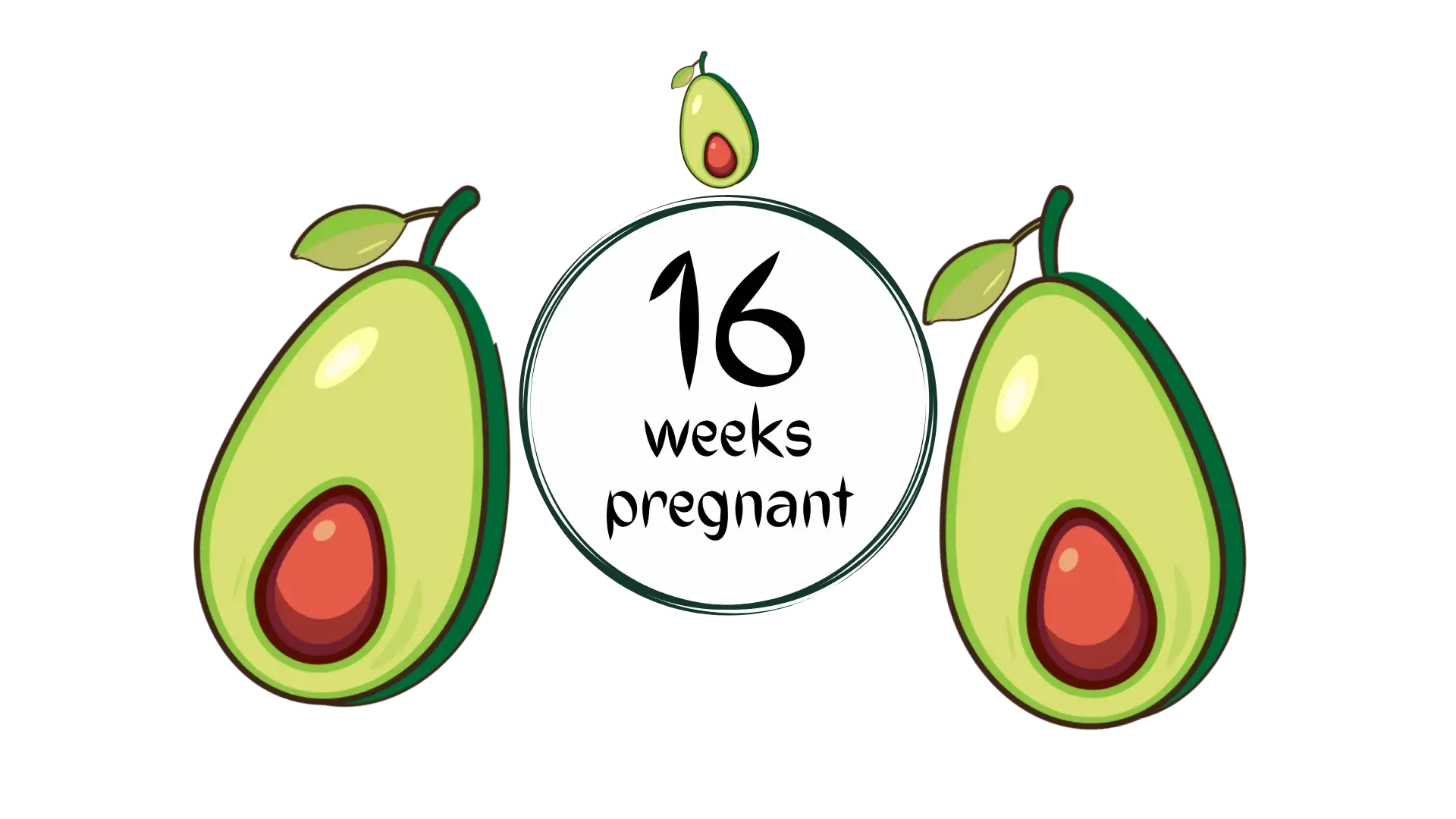Explore Your Interest
At 16 weeks, you have almost reached the end of your fourth month. You now have about 5 months or twenty-four weeks to go. You’re likely enjoying the second trimester, often called the “honeymoon period” of pregnancy.
Also, you might notice your baby bump becoming more prominent as your little one grows inside you. And excitingly, you might even feel your baby’s delightful flutters and movements—a magical connection!
Take a peek
Take a peek
The circulatory system of the foetus is now up and running. As a result, that tiny heart can pump approximately 25 quarts of blood daily.
This week, your baby’s eyes make side-to-side movement patterns and can perceive light although they are still closed.
At 16 weeks, foetuses may be able to make that newborn’s thumb-sucking motions.
Take a Peak
The circulatory system of the foetus is now up and running. As a result, that tiny heart can pump approximately 25 quarts of blood daily.
This week, your baby’s eyes make side-to-side movement patterns and can perceive light although they are still closed.
At 16 weeks, foetuses may be able to make that newborn’s thumb-sucking motions.
Baby Development at Week 16
This week, all your baby is doing is growing, growing, and growing, and in the next few weeks, your baby will double its size. Presently, your baby is about the size of an avocado. Their head is now more upright than before, and their ears and eyes have settled into their permanent positions, giving your baby a more distinctive look.
Complex body systems like the urinary and circulatory systems are starting to function. Your baby’s heart is pumping about 25 quarts of blood daily. Yet, by week 40, this volume will surge to an astonishing 1,900 quarts daily!
This week, your baby is now reacting to light. Although their eyes are not open, they can sense light and even turn away. Your baby’s limbs are much more developed, and the bones that have already formed become stronger as they accumulate calcium. Your baby’s nervous system is now operational, allowing its muscles to respond to signals from the brain.
It’s incredible to know that your baby can already make a fist and might even be exploring the habit of sucking their thumb. Your baby is rolling and kicking, and you may feel a gentle fluttering sensation. However, if you haven’t felt anything yet, don’t fret—it’s common to miss these early movements because the amniotic fluid cushions any movement your baby makes.
Foetal Growth at Week 16
FETAL GROWTH
WEEK 16:
Your baby is about the size of an avocado

LENGHT
WEIGHT
4.57
100
Inches
grams

From head to heel

Foetal Growth at Week 16
FETAL GROWTH
WEEK 16:
Your baby is about the size of an avocado

LENGHT
WEIGHT
4.57
100
Inches
grams

From head to heel

Body Changes at Week 16
As your pregnancy progresses, your uterus expands, your placenta grows, and your body produces increased amniotic fluid, which is a protective cushion for your baby. Your body experiences a significant increase in blood volume—up 30-50%—resulting in more circulation. This increase in circulation brightens your face. Your body also produces hormones that kick your oil glands into high gear, producing a shiny complexion.
These factors combined can create what’s commonly known as the “pregnancy glow.” If your skin feels overly oily, opting for an oil-free cleanser can help restore balance. Otherwise, simply embrace your glow with a smile and enjoy this radiant phase of pregnancy!
Baby Bump at Week 16
By 16 weeks of pregnancy, it’s common for your baby bump to become noticeable, although every woman is unique. During the second trimester, the uterus shifts upwards and forwards as both the baby and uterus grow, eventually outgrowing the pelvic area. This change in positioning can sometimes lead to pelvic pain or discomfort as the pregnancy progresses.
However, don’t compare your belly with any other person’s own. Some people still don’t show a bump at 16 weeks, while others’ bumps are very pronounced.
The time the bump shows depends on a woman’s shape and size and whether this is her first, second or third pregnancy.
As your bump grows, consider investing in maternity clothes that might help you feel more at ease as your body changes throughout pregnancy.
Pregnancy Symptoms at Week 16
During pregnancy, hormonal changes can lead to alterations in skin pigmentation, including the darkening of the linea nigra, a line that appears on the abdomen. You may also observe darkening in other areas of your body.
In most instances, this pigmentation is temporary and will fade after giving birth, so there’s usually no cause for concern.
As your pregnancy progresses, your breasts may continue to enlarge and become more tender. While some expectant mothers may welcome this change, it can be uncomfortable if you already have a large chest.
However, be rest assured that after giving birth and you breastfeed, your breasts should return to their pre-pregnancy size, so there’s no need to part with your favourite bras just yet!
During pregnancy, you may experience some changes in pigmentation, and this is also when you might start noticing the well-known “pregnancy glow.” The term “pregnancy glow” describes the shiny, vibrant, and refreshed appearance of the skin that some women experience during pregnancy.
Increased blood volume during pregnancy leads to more blood flowing to the skin’s blood vessels, giving the skin a flushed appearance. Additionally, hormonal fluctuations can prompt the skin glands on the face to produce more oil, resulting in a slightly shinier complexion.
An aching back pain is a common side effect attributed to hormonal changes. Your breasts growing in size can also contribute to discomfort in your back. To alleviate this discomfort, consider engaging in low-impact exercises such as prenatal yoga, which can help strengthen your muscles and improve flexibility.
Incorporating regular stretching into your routine can also relieve back pain and promote overall comfort during pregnancy.
Constipation is a common pregnancy symptom that many women experience during this stage. According to research, 11% to 38% of pregnant women deal with constipation at some point, largely due to hormonal changes occurring in the body. Although it’s not harmful to you or your baby, constipation can be uncomfortable and frustrating.
Other factors, such as decreased physical activity, low-fibre diets, reduced water intake, or iron supplements, can also contribute to constipation.
Occasional nose bleeds may occur due to increased blood flow in the body, causing tiny blood vessels in the nose to rupture. While nosebleeds are generally harmless, it’s essential to manage them properly. To stop a nosebleed, it’s recommended to sit down and keep your head higher than your heart to reduce blood flow.
Avoid leaning your head back to prevent swallowing blood. Instead, continuously pinch your nose with your thumb and index finger for at least five minutes to help staunch the bleeding. Additionally, applying an ice pack on the nose can constrict blood vessels and facilitate quicker cessation of bleeding.
Varicose veins are swollen veins that can appear blue or dark purple, often with a lumpy, bulging, or twisted appearance. While varicose veins are typically not a serious concern and may not require treatment, it’s important to consult your GP or midwife if you notice them, especially if they cause any pain, discomfort, or irritation.
This is because varicose veins can be a risk factor for deep vein thrombosis (DVT), a potentially dangerous blood clot that requires medical attention.
While vaginal discharge is beneficial as it protects the birth canal from infection, it may not be comfortable. Despite any discomfort, it’s important to avoid the temptation to use douches or feminine wipes. These products can irritate the genital tract and disrupt the natural balance of bacteria, potentially leading to infection.
Maintaining good hygiene practices, such as gentle washing with water and mild soap, is sufficient for vaginal health. If you have concerns about your vaginal discharge or experience any unusual symptoms, it’s advisable to consult with your healthcare provider for further guidance and evaluation.
Pregnancy Symptoms at Week 16
During pregnancy, hormonal changes can lead to alterations in skin pigmentation, including the darkening of the linea nigra, a line that appears on the abdomen. You may also observe darkening in other areas of your body.
In most instances, this pigmentation is temporary and will fade after giving birth, so there’s usually no cause for concern.
As your pregnancy progresses, your breasts may continue to enlarge and become more tender. While some expectant mothers may welcome this change, it can be uncomfortable if you already have a large chest.
However, be rest assured that after giving birth and you breastfeed, your breasts should return to their pre-pregnancy size, so there’s no need to part with your favourite bras just yet!
During pregnancy, you may experience some changes in pigmentation, and this is also when you might start noticing the well-known “pregnancy glow.” The term “pregnancy glow” describes the shiny, vibrant, and refreshed appearance of the skin that some women experience during pregnancy.
Increased blood volume during pregnancy leads to more blood flowing to the skin’s blood vessels, giving the skin a flushed appearance. Additionally, hormonal fluctuations can prompt the skin glands on the face to produce more oil, resulting in a slightly shinier complexion.
An aching back pain is a common side effect attributed to hormonal changes. Your breasts growing in size can also contribute to discomfort in your back. To alleviate this discomfort, consider engaging in low-impact exercises such as prenatal yoga, which can help strengthen your muscles and improve flexibility.
Incorporating regular stretching into your routine can also relieve back pain and promote overall comfort during pregnancy.
Constipation is a common pregnancy symptom that many women experience during this stage. According to research, 11% to 38% of pregnant women deal with constipation at some point, largely due to hormonal changes occurring in the body. Although it’s not harmful to you or your baby, constipation can be uncomfortable and frustrating.
Other factors, such as decreased physical activity, low-fibre diets, reduced water intake, or iron supplements, can also contribute to constipation.
Occasional nose bleeds may occur due to increased blood flow in the body, causing tiny blood vessels in the nose to rupture. While nosebleeds are generally harmless, it’s essential to manage them properly. To stop a nosebleed, it’s recommended to sit down and keep your head higher than your heart to reduce blood flow.
Avoid leaning your head back to prevent swallowing blood. Instead, continuously pinch your nose with your thumb and index finger for at least five minutes to help staunch the bleeding. Additionally, applying an ice pack on the nose can constrict blood vessels and facilitate quicker cessation of bleeding.
The circulatory system of the Varicose veins are swollen veins that can appear blue or dark purple, often with a lumpy, bulging, or twisted appearance. While varicose veins are typically not a serious concern and may not require treatment, it’s important to consult your GP or midwife if you notice them, especially if they cause any pain, discomfort, or irritation.
This is because varicose veins can be a risk factor for deep vein thrombosis (DVT), a potentially dangerous blood clot that requires medical attention. is now up and running. As a result, that tiny heart can pump approximately 25 quarts of blood daily.
While vaginal discharge is beneficial as it protects the birth canal from infection, it may not be comfortable. Despite any discomfort, it’s important to avoid the temptation to use douches or feminine wipes. These products can irritate the genital tract and disrupt the natural balance of bacteria, potentially leading to infection.
Maintaining good hygiene practices, such as gentle washing with water and mild soap, is sufficient for vaginal health. If you have concerns about your vaginal discharge or experience any unusual symptoms, it’s advisable to consult with your healthcare provider for further guidance and evaluation.
Pregnancy Concerns at Week 16
As this is when you are gaining weight alongside your baby, you may be concerned about excess weight gain. Depending on what you weighed before the pregnancy, your doctor would advise you on how much weight you should gain. Excess weight gain can harm you and your baby during childbirth because it causes birth complications such as pre-eclampsia.
Even though the risk of miscarriage decreases significantly in the second trimester, any spotting, bleeding, or severe abdominal pain should be reported to your doctor right away.
Health Tips for Pregnancy Week 16
Focus on maintaining a well-balanced diet with plenty of nutrients for you and your growing baby. Ensure you get sufficient amounts of folic acid, iron, calcium, and other important vitamins and minerals necessary for a healthy pregnancy. Incorporate nutrient-rich foods such as fruits, vegetables, whole grains, lean proteins, and dairy products into your meals.
Sitting at a desk throughout your pregnancy can exacerbate any existing backaches. To alleviate discomfort, consider using a support pillow behind your lower back or investing in an ergonomic chair that promotes proper posture by keeping your back straight rather than hunched over.
These adjustments can help reduce strain on your back and make long periods of sitting more comfortable during pregnancy.
Around week 16 of your pregnancy, you may start experiencing nasal stuffiness and occasional nosebleeds, which can persist and worsen until the end of your pregnancy. To alleviate these symptoms, consider using a humidifier to add moisture to the air and a neti pot with bottled or distilled water to rinse your nasal passages. You can also consult your healthcare provider for additional treatment options.
Vitamin B1, known as thiamine, is crucial in converting food into energy and maintaining a healthy nervous system. During pregnancy, your body requires more vitamin B1 to support the growth and development of your baby.
However, without supplements, you can typically obtain all the B1 you need through your diet. Foods rich in vitamin B1 include pork, salmon, whole-grain pasta, dried beans, lentils, green peas, pecans, and cereals.
Unless you have a peanut allergy, there’s no need to avoid peanuts or peanut butter during pregnancy. Recent research indicates that consuming peanuts while pregnant doesn’t increase the risk of nut allergies in your baby and may even help prevent them.
If you have food allergies, consult your doctor and an allergist to determine what foods are safe during pregnancy.
Rather than nursing back pain on the sofa, try gentle prenatal yoga or pregnancy-safe pilates exercises. These activities can help stretch and loosen your spine and relieve tension, often the main cause of back pain. Yoga and pilates can also boost your overall energy and mood, helping you manage any remaining discomfort better.
You can also do simple exercises to strengthen your abdominal muscles, which can reduce the strain on your lower back. Remember, avoid exercises that require lying on your back now that you’re in your second trimester.
During pregnancy, your skin produces extra oil, which can lead to pimples. To manage breakouts, use oil-free products that are effective yet gentle for both you and your baby. Opt for cleansers and treatments containing salicylic acid, benzoyl peroxide, or azelaic acid, and avoid isotretinoin. Always consult your doctor before starting any acne treatment.
If meat, chicken, and fish make you queasy, don’t worry. You’ll likely be able to eat them again soon. In the meantime, get your protein from alternatives like cottage cheese, yoghurt, beans, soy products (such as tofu or edamame), or quinoa, a protein-rich grain.
Health Tips for Pregnancy Week 16
Focus on maintaining a well-balanced diet with plenty of nutrients for you and your growing baby. Ensure you get sufficient amounts of folic acid, iron, calcium, and other important vitamins and minerals necessary for a healthy pregnancy. Incorporate nutrient-rich foods such as fruits, vegetables, whole grains, lean proteins, and dairy products into your meals.
Sitting at a desk throughout your pregnancy can exacerbate any existing backaches. To alleviate discomfort, consider using a support pillow behind your lower back or investing in an ergonomic chair that promotes proper posture by keeping your back straight rather than hunched over. These adjustments can help reduce strain on your back and make long periods of sitting more comfortable during pregnancy.
Around week 16 of your pregnancy, you may start experiencing nasal stuffiness and occasional nosebleeds, which can persist and worsen until the end of your pregnancy. To alleviate these symptoms, consider using a humidifier to add moisture to the air and a neti pot with bottled or distilled water to rinse your nasal passages. You can also consult your healthcare provider for additional treatment options.
Vitamin B1, known as thiamine, is crucial in converting food into energy and maintaining a healthy nervous system. During pregnancy, your body requires more vitamin B1 to support the growth and development of your baby. However, without supplements, you can typically obtain all the B1 you need through your diet.
Foods rich in vitamin B1 include pork, salmon, whole-grain pasta, dried beans, lentils, green peas, pecans, and cereals.
Unless you have a peanut allergy, there’s no need to avoid peanuts or peanut butter during pregnancy. Recent research indicates that consuming peanuts while pregnant doesn’t increase the risk of nut allergies in your baby and may even help prevent them. If you have food allergies, consult your doctor and an allergist to determine what foods are safe during pregnancy.
Rather than nursing back pain on the sofa, try gentle prenatal yoga or pregnancy-safe pilates exercises. These activities can help stretch and loosen your spine and relieve tension, often the main cause of back pain. Yoga and pilates can also boost your overall energy and mood, helping you manage any remaining discomfort better.
You can also do simple exercises to strengthen your abdominal muscles, which can reduce the strain on your lower back. Remember, avoid exercises that require lying on your back now that you’re in your second trimester.
During pregnancy, your skin produces extra oil, which can lead to pimples. To manage breakouts, use oil-free products that are effective yet gentle for both you and your baby. Opt for cleansers and treatments containing salicylic acid, benzoyl peroxide, or azelaic acid, and avoid isotretinoin. Always consult your doctor before starting any acne treatment.
If meat, chicken, and fish make you queasy, don’t worry. You’ll likely be able to eat them again soon. In the meantime, get your protein from alternatives like cottage cheese, yoghurt, beans, soy products (such as tofu or edamame), or quinoa, a protein-rich grain.
Advice for Partners
Mom may start feeling the baby’s first movements, known as quickening. This experience enhances the bond between mother and child. However, you may feel excluded from this physical connection. Yet, you can still bond by engaging in daily conversations with the baby. Reading or singing to the baby is also a great way to strengthen the parent-child relationship, even before feeling the baby’s movements firsthand.
Your partner may also struggle with sleep due to lower back or abdominal discomfort or nasal congestion. To support your pregnant partner, you can create a soothing environment in the bedroom. Providing extra pillows can help alleviate back and belly discomfort by offering additional support.
A humidifier can add moisture to the air, easing nasal congestion, especially if the air is dry. You can also use a white noise machine to drown out disruptive sounds.
Pregnancy Checklist for Week 16
- Engage in activities beneficial to your baby like playing music or talking to your belly to bond with your baby, as research shows that prenatal music exposure can positively impact newborn behaviour.
- As your body changes, you might find that your regular clothes aren’t as comfy as they used to be. Treat yourself to stylish and comfy maternity wear to stay comfortable and fabulous!
- Your breasts have likely increased in size, and you may be experiencing breast spillage. Consider investing in high-quality maternity or nursing bras that offer better support for your breasts.
- Consider taking a series of pregnancy photos to track the growth of your 16-week pregnant belly over the next few months.
- Remember to use sunscreen, as increased melanin can darken freckles and moles. Most sunscreens are safe during pregnancy. Just choose one that protects against both UVA and UVB rays.
- Tell your older children about the baby and show them your 16-week pregnant belly. This will help them prepare and bond with their new sibling.
- Before meeting your midwife, consider any questions or uncertainties you have. It’s helpful to jot them down—your midwife won’t mind.
Key Facts
Although not open yet, your baby’s eyes can sense light and may even turn away from it.
Your baby measures around 4.57 inches and weighs about 100 grams, comparable to an avocado.
Your uterus continues to expand, your placenta grows, and your body produces increased amniotic fluid, which protects your baby.
It’s typical for the baby bump to become noticeable by 16 weeks of pregnancy, although each woman’s experience is unique.
Hormonal fluctuations and increased blood volume during pregnancy can lead to a radiant, shiny complexion known as the “pregnancy glow.”
It’s recommended to cultivate the habit of sleeping on your side, preferably your left side, starting from the previous week of pregnancy.
If you can’t tolerate meat, chicken, or fish, get your protein from alternatives like cottage cheese, yoghurt, beans, soy products (tofu or edamame), or quinoa.
If your pregnant partner finds it hard to sleep due to nasal congestion, a humidifier can add moisture to the dry air.
Engage in activities beneficial to your baby, such as playing music or talking to your belly. Research suggests that prenatal music exposure can positively impact newborn behaviour.
Frequently Asked Questions
At week 16, your baby weighs about 100 grams and measures 4.57 inches. This week, its size can be likened to an avocado. Your baby now looks more like a human, and its head is standing straighter than before.
As your pregnancy progresses, your uterus expands, your placenta grows, and your body produces increased amniotic fluid, which is a protective cushion for your baby. Your body experiences a significant increase in blood volume—up 30-50%—resulting in more circulation. This increase in circulation brightens your face.
Your body also produces hormones that kick your oil glands into high gear, producing a shiny complexion. These factors combined can create what’s commonly known as the “pregnancy glow.” If your skin feels overly oily, opting for an oil-free cleanser can help restore balance. Otherwise, simply embrace your glow with a smile and enjoy this radiant phase of pregnancy!
This week, all your baby is doing is growing, growing, and growing, and in the next few weeks, your baby will double its size. Presently, your baby is about the size of an avocado. Their head is now more upright than before, and their ears and eyes have settled into their permanent positions, giving your baby a more distinctive look.
Complex body systems like the urinary and circulatory systems are starting to function. Your baby’s heart is pumping about 25 quarts of blood daily. Yet, by week 40, this volume will surge to an astonishing 1,900 quarts daily!
This week might be when you first feel your baby move—a significant milestone known as “quickening.” Typically, these movements are felt between 16 and 20 weeks of pregnancy and can be described as tiny pulses, fluttering sensations, or bubbles in your abdomen.
However, it’s normal for some women, especially first-time mothers, to experience quickening a bit later, around 20 to 24 weeks. There’s no need to worry if you haven’t felt anything yet. You still have plenty of time to experience these precious moments in the weeks and months ahead.
For many years, there was a misconception that visiting the dentist during pregnancy was risky. However, it’s now understood that going to the dentist for preventative care and exams is safe and highly recommended during pregnancy. Good dental health is important because poor oral hygiene can lead to serious complications, such as premature birth.
Dental treatments such as crowns and fillings should be carried out to prevent infections. However, non-emergency and elective procedures are generally best postponed until after delivery.
Frequently Asked Questions
At week 16, your baby weighs about 100 grams and measures 4.57 inches. This week, its size can be likened to an avocado. Your baby now looks more like a human, and its head is standing straighter than before.
As your pregnancy progresses, your uterus expands, your placenta grows, and your body produces increased amniotic fluid, which is a protective cushion for your baby. Your body experiences a significant increase in blood volume—up 30-50%—resulting in more circulation. This increase in circulation brightens your face.
Your body also produces hormones that kick your oil glands into high gear, producing a shiny complexion. These factors combined can create what’s commonly known as the “pregnancy glow.” If your skin feels overly oily, opting for an oil-free cleanser can help restore balance. Otherwise, simply embrace your glow with a smile and enjoy this radiant phase of pregnancy!
This week, all your baby is doing is growing, growing, and growing, and in the next few weeks, your baby will double its size. Presently, your baby is about the size of an avocado. Their head is now more upright than before, and their ears and eyes have settled into their permanent positions, giving your baby a more distinctive look.
Complex body systems like the urinary and circulatory systems are starting to function. Your baby’s heart is pumping about 25 quarts of blood daily. Yet, by week 40, this volume will surge to an astonishing 1,900 quarts daily!
This week might be when you first feel your baby move—a significant milestone known as “quickening.” Typically, these movements are felt between 16 and 20 weeks of pregnancy and can be described as tiny pulses, fluttering sensations, or bubbles in your abdomen.
However, it’s normal for some women, especially first-time mothers, to experience quickening a bit later, around 20 to 24 weeks. There’s no need to worry if you haven’t felt anything yet. You still have plenty of time to experience these precious moments in the weeks and months ahead.
For many years, there was a misconception that visiting the dentist during pregnancy was risky. However, it’s now understood that going to the dentist for preventative care and exams is safe and highly recommended during pregnancy. Good dental health is important because poor oral hygiene can lead to serious complications, such as premature birth. Dental treatments such as crowns and fillings should be carried out to prevent infections. However, non-emergency and elective procedures are generally best postponed until after delivery.
1. American Academy of Dermatology Association. IS ANY ACNE TREATMENT SAFE TO USE DURING PREGNANCY?
2. Abrams, E.M. and Sicherer, S.H., 2018. Maternal peanut consumption and risk of peanut allergy in childhood. CMAJ, 190(27), pp.E814-E815.
3. American Pregnancy Association. Roles of Vitamin B in Pregnancy.
4. American Pregnancy Association. 16 Weeks Pregnant.
5. Arya, R., Chansoria, M., Konanki, R. and Tiwari, D.K., 2012. Maternal music exposure during pregnancy influences neonatal behaviour: An open-label randomized controlled trial. International journal of pediatrics, 2012.
6. Emma’s diary. 16 weeks pregnant.
7. Lets Talk Birth And Baby. Pregnancy week 16.
8. NHS. Week16.
9. Ren, Q.W., Yang, F.F., Han, T.B., Guo, M.Z., Zhao, N., Feng, Y.L., Yang, H.L., Wang, S.P., Zhang, Y.W. and Wu, W.W., 2021. Relationship between the pre-pregnancy BMI, gestational weight gain, and risk of preeclampsia and its subtypes. Zhonghua liu xing bing xue za zhi= Zhonghua liuxingbingxue zazhi, 42(11), pp.2037-2043.
10. Swathi, K., Koothati, R.K., Motor, R.R., RajaShekar, C.H. and Vallakonda, S., 2021. Knowledge and experience of women about dental services utilization during pregnancy: a cross-sectional questionnaire study. Journal of Pharmacy and Bioallied Sciences, 13(Suppl 2), pp.S1042-S1046
11. Vazquez, J.C., 2010. Constipation, haemorrhoids, and heartburn in pregnancy. BMJ clinical evidence, 2010.
12. WebMD. Your Pregnancy Week by Week: Weeks 13-16.






